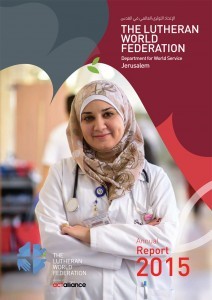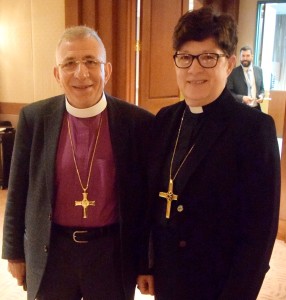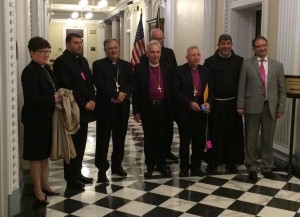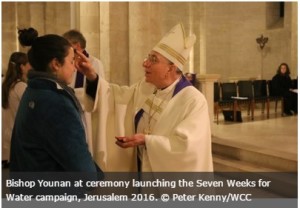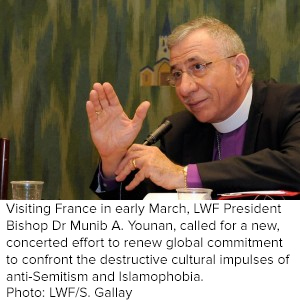The grace of our Lord Jesus Christ, the love of God, and the communion of the Holy Spirit be with you all.
2016 Easter Message
From Bishop Dr. Munib Younan
Bishop of the Evangelical Lutheran Church in Jordan and the Holy Land
+++
1 Corinthians 15:1-2
Now I should remind you, brothers and sisters, of the good news that I proclaimed to you, which you in turn received, in which also you stand, through which also you are being saved, if you hold firmly to the message that I proclaimed to you—unless you have come to believe in vain.
+++
Salaam and grace to you from Jerusalem, in the name of our Risen Lord Jesus Christ.
Today Christians across the world rejoice in the Good News we have received, on which we stand, and through which we have been saved: that Christ died for our sins in accordance with the scriptures, and that he was buried, and that he was raised on the third day in accordance with the scriptures.
Jesus is raised from the tomb! Alleluia!
Light is stronger than darkness! Alleluia!
Life is stronger than death! Alleluia!
This is the center of our Christian faith and the source of our hope. For this reason, we celebrate Easter with joy and love.
For this reason, we sing along with Ephraem this beautiful hymn from the 4th century:
Glory to you, friend of all!
Glory to you, O merciful Lord!
Glory to you, longsuffering God!
Glory to you, who takes away all sins!
Glory to you, who came to save us!
Glory to you, who became flesh in the womb of the virgin!
Glory to you, bound in cords!
Glory to you, whipped and scourged!
Glory to you, mocked and derided!
Glory to you, nailed to the cross!
Glory to you, buried and risen!
Glory to you, proclaimed to all humankind, who believe in you! Amen.
This Easter Good News has come to the world again at just the right time.
At this time, the world desperately needs the message of the empty tomb. We need the light and life of Easter morning. In just the first three months of this year, we in the Middle East have been witnessing an alarming wave of violence. Recent days have seen tragedies unfold in Turkey, Syria, Iraq, the Ivory Coast, Pakistan, Nigeria, and many other nations. Even this week, which we call Holy, began with a terror attack in Brussels. It’s difficult to comprehend the amount of death and destruction which has plagued our world, in just the few short months since the world’s Christians gathered to celebrate the birth of the Prince of Peace.
All across the world today we see that a culture of death and fear is heavily promoted to the people – by extremists, by the media, even by some politicians. The message they plant in us is that we should be afraid of losing our freedoms, or afraid of giving away too much power. They tell us we should be afraid of the evil which lurks beyond our borders, or the evil which lurks even next door. This culture of death and fear instills in us a certain envy, in which the only way for us to have life is to deny the life of the other—whether the enemy, or the neighbor of a different religion, or the refugee.
This culture of death is what Jesus experienced on his Via Dolorosa, the Way of the Cross.
Jesus experienced a culture of deception and betrayal when one of his disciples joined him for the Last Supper, but then sold him for thirty pieces of silver.
Jesus experienced a culture of denial and abandonment when Peter emphatically denied him, not once but three times.
Jesus experienced a culture of power over others when Herod and Pilate reconciled out of their common desire to humiliate him.
Jesus knew well the culture of death, and where it ultimately leads.
Today we are haunted and even obsessed by this same culture of death, but this culture is exactly what the resurrection of Jesus destroys. The resurrection of Jesus means we must not accept such a culture. We will not give in to despair, to hopelessness, to violence, or to complacency. We need not stay in the tomb, for by the power of Jesus’ resurrection, we have been raised to new life with him.
The resurrection reveals how the justice of God is wholly different from the justice of the world. Where the world insists that death and fear and jealousy and mistrust and deceiving are unavoidable facts of existence, a culture we must accept and work within, necessary evils which ensure our own personal happiness, the resurrection proclaims exactly the opposite. By rising from the tomb, Jesus shows us a new path forward. The Risen Lord has given us a Culture of Life.
And what is this life? It is a life of freedom, a life of joy, a life of equal dignity. The resurrected life is one of acceptance and love and protection of the other. The resurrected life is one which honors every gender, every race, every ability, every nationality, every faith. This new life, our Easter life, is the culture Christians everywhere share, in spite of differences in language or tradition or geographic location. Together, in every corner of the world, followers of Jesus share and proclaim and testify to this Culture of Life.
Perhaps over the years, we have allowed the world’s culture of death and fear to influence us. Perhaps we have opened the door to jealousy, to mistrust of the other, even to an acceptance of violence. Perhaps we have forgotten how Easter morning was a new day – the first day of the week, the first day of Jesus’ resurrected life, but also the first day of the church’s unique Culture of Life.
How could anyone forget such Good News? How could we forget we have been raised? How could we forget who we are?
When the church stands by as refugee families drown seeking freedom, we have forgotten.
When the church honors bell towers and organs over bread for the hungry, we have forgotten.
When the church stays silent in the face of injustice, oppression, and occupation, we have forgotten.
When the church’s message begins to reflect fear of the world outside, we have forgotten.
When we, who have already been raised to life, begin to feel comfortable inside the tomb, we have forgotten who we are. We have forgotten that we are children of the resurrection, children of abundant life.
Dear sisters and brothers in Christ, if we have forgotten, then the Day of Resurrection is the day we remember. On that resurrection morning, the women stood at the empty tomb and could not believe their eyes. But then, the two men in dazzling clothes appeared and said to them: “Why do you look for the living among the dead? He is not here, but has risen. Remember how he told you, while he was still in Galilee, that the Son of Man must be handed over to sinners, and be crucified, and on the third day rise again.”
And then, the women remembered! They remembered, and they ran to tell the Good News to all who would listen.
On this Day of the Resurrection, we also remember! We remember that the stone was already rolled back. We remember that that tomb was empty. We remember how God used the cross, an instrument of humiliation and death, to give us life. For this reason, the Orthodox liturgy sings: “Jesus is risen from the dead. He has overcome death with death and given life to all who are in tombs.”
By his rising, Jesus has freed us from the culture of death and fear. With him, and with all believers around the world, we now share one common Culture of Life.
On this Easter morning, I pray that Christians everywhere will remember who they are: People of life. People of joy and of freedom. People of mercy and forgiveness. People of love and of liberation.
Above all, remember that we are a people empowered by the resurrection of Jesus Christ to be ambassadors of our unique culture—a culture of life and life abundant. Therefore, in every church, in every community, in every nation, in every context, in every situation, let our testimony be as one:
The tomb is empty!
Life is stronger than death!
Alleluia, Christ is risen!
Il-Masih Kam! Hakkan kam!
Text from here

